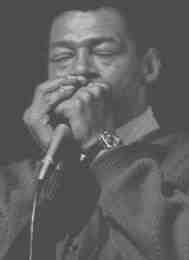ALBANY - Can't get your mojo working after a hard day
at the office?
Huffing and puffing but can't blow the house down?
Feeling like Howlin' Wolf but just, well, howling?
Harp players take heart: Coming to a music store near you is a
blow-by-blow instructional volume of harmonica master Little Walter Jacobs' most soulful
solos as only the late Chicago blues master could blow.
"The Blues Harp Solos of Little Walter was amassed and transcribed
by Albany musician Glenn Weiser, who says the solos are worth saving, even though a
quarter of a century has has passed since they faded from the charts.
"The blues was the source of rock 'n' roll," said Weiser, who
devoted 18 months to the collection, meticulously transcribing more than 70 solos, one
measure at a time.
It was an effort born of the superstition and suffering that define the
music, he said.
Weiser's not the first musician to be taken with the fervent outpouring
of the urban blues. A group of British rockers was so electrified by they named named
themselves after a blues tune hoping to catch the ear of the world.
The Rolling Stones took their name from Muddy Water's "Rollin'
Stone and and covered his "I Can't Be Satisfied" on their second album.
It was while recording with the legendary Waters that Little Walter
Jacobs came into his own, breaking for a solo career in 1952, when his catchy
instrumental, "Juke," topped the blues charts. Fourteen Top 10 hits followed.
Little Walter is considered the greatest of the postwar Chicago blues
harp players, Weiser said of his decision to spotlight the musician's work in this, his
third harmonica compilation.
But there was more to Weiser's zeroing in on the tunes of Little Walter
than the musician's pre-eminence. There was superstition, a prominent theme in blues songs
such as "I Got My Mojo Working" and "I Ain't Superstitious."
"For one thing, Little Walter and I have the same birthday, May
1st," said Weiser. "And "Juke was recorded during the month and year of my
birth."
Furthermore, Weiser, 38, puffed out his first harmonica song in 1968, the year Little
Walter was killed in a Chicago street fight. And the musician died at the age of 37, the
age at Weiser undertook the project what he called "the literary French Foreign
Legion approach" to get over a soured relationship.
But why, in 22 years after Little Walter's violent end, are the harp
virtuoso's compositions and solos being published for the first time?
"Most of the music was improvised to some extent, so it was never written down,"
Weiser said.
In, fact, he said, Little Walter, like most blues musicians, was unable
to read or write music.
Weiser, it appears, is the first musically literate harmonica player
with the enterprise for the project. His tools were a two-speed tape recorder, knowledge
of the subject honed over decades - and enough patience to pull them together.
"I immersed myself in the music and and wrote two books
concurrently. The idea was to keep myself constantly busy," said Weiser, whose
musical journey has brought him from a teen-age idol-watcher at Woodstock to his own music
instruction studio in Albany. He's played his share of smoky clubs along the way, and is a
familiar sight in Albany's night scene.
Weiser transcribed several thousand measures for the Little Walter at
the rate of about 12 measures an hour, listening to each several times at fast and
slow speed.
"Little Walter used very complex rhythms but the music is playable
for a serious student," said Weiser, who's also translated volumes of fiddle music
for the harmonica and classical guitar.
Weiser's most recent project, "Blues and Rock Harmonica," and
"Fiddle Tunes for Harmonica," were distributed by Hal Leonard Publishing Co.,
which will also publish the Little Walter collection later this year.
Each tune in the latest book lists the album on which the original
Little Walter recording can be heard. An instructional section at the beginning breaks
down the tangled rhythms.
So Weiser's book takes care of the technical side of playing the blues.
But to fully effect the soulful melancholy postwar Chicago harp
players, the musician's just going to to have to depend on his own "Sad Hours"
in this "Mean Old World."
If you wish to be updated on the Little Walter book, you can get on a mailing list
by writing to Glenn at: celticguitar1@nycap.rr.com
